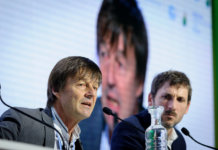Construction begins this summer on a sustainable development project in the Netherlands aptly named “ReGen Villages”.
https://www.instagram.com/p/BForC5tu80S/?taken-by=effektarchitects&hl=en
ReGen stands for “regenerative”, the perfect name for a village aiming to be completely self-sufficient. Goals include: powering and feeding itself and building an entirely closed input and output cycle.
ReGen Villages Holding, B.V., an innovative real estate development company founded by entrepreneur James Ehrlich. They’ve partnered with Copenhagen-based architecture firm EFFEKT to bring the project to fruition. The company is also developing four more eco-villages in Sweden, Norway, Denmark and Germany.
ReGen project details
The “village” will consist of 100 homes spread across 15,500 square meters in the planned city of Almere in the Netherlands.
While this may sound like a completely futuristic concept, the village itself utilizes many already-existing green technologies. Examples include: energy-positive homes, mixed renewable energy sources and energy storage. Food production will include: organic food production, vertical farming, and aquaponics. Also, water management and waste-to-resource systems says DW.
Potential residents can choose from a variety of home typologies. Homes range from 80-140 square meters, with potential for multiple floors and a terrace. Each home will also be encased in a glass shell to protect from The Netherlands cold and wet climate. Homes are also equipped with passive heating and cooling systems—a design approach focusing on heat gain control and heat dissipation to improve thermal comfort with little or no energy consumption. As well, built-in solar panels, a garden and water collection. Waste can also be converted to biogas or composted.
Public areas will include: electric car stations, space for livestock, communal dining and community centers.
Food production and consumption at the source
A main focus of the ReGen village is to produce food to feed the village’s residents. According to EFFEKT co-founder Sinus Lynge:
“Today we spend 40% of the surface of our continents producing food. Food production is the single largest emitter of greenhouse gasses, the biggest driver of deforestation and responsible for 70 percent of our global freshwater consumption. We ship our food from one end of the world to another just to waste 30 percent of the total production before consumption.”
https://www.instagram.com/p/BFWZ-4wO83b/?tagged=regenvillages&hl=en
In the village, sustainable food production will be through a variety of methods including aquaponics and vertical farming. Both of these methods also require much less space than traditional farming methods.
https://www.instagram.com/p/BFWaUe8O84q/?taken-by=effektarchitects&hl=en
https://www.instagram.com/p/BFWZv4gu82u/?taken-by=effektarchitects&hl=en
Building an integrated community design
According to the ReGen, “ReGen Villages is all about applied technology,” the company points out on its website. “Already existing technologies are simply being applied into an integrated community design, providing clean energy, water and food right off the doorstep. ReGen Villages adds not only environmental and financial value, but also social value, by creating a framework for empowering families and developing a sense of community, where people become part of a shared local eco-system: reconnecting people with nature and consumption with production.”
For a more complete look at the resource cycle of the ReGen Village, click here.
Find out more about project from the EFFEKT website, and to apply to live in the German ReGen Village visit the link here.









